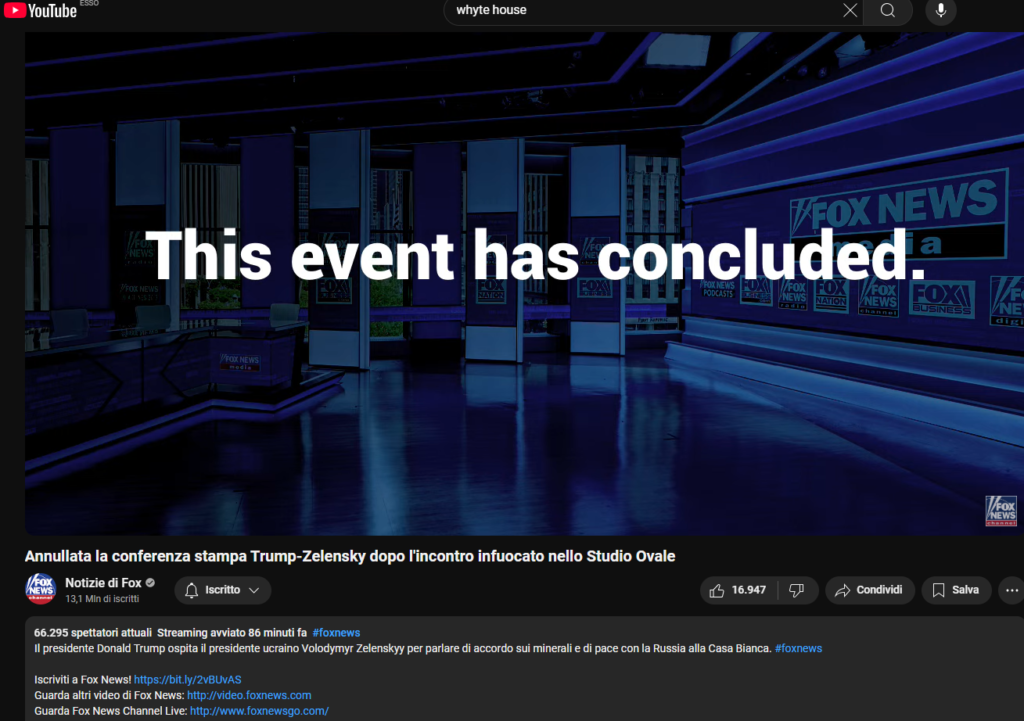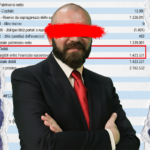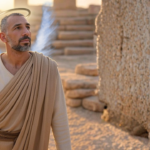Zelensky emerges as a complete political illiterate, ensnared by a mythomaniacal hubris that’s utterly reckless toward the millions of Ukrainians who’ve been yearning for peace for far too long.
President Trump, by contrast, reveals himself as a humane and sagacious figure—patient, devoid of the bombast he’s so often accused of, with eyes that betray a lightning-fast, profound intelligence.
Were it not so, he’d never have stormed back into the White House against the full weight of the establishment. Trump’s a man who occasionally says ghastly things but does righteous ones; the political class, which fancies itself almost racially superior to him, meticulously crafts beautiful rhetoric while quietly committing horrors with the other hand.
That’s my formula for sketching this portrait.
In this sprawling interview—which I’ve just finished watching here in Moscow and subtitled using an auto-translator (apologies for any glitches, though anyone with a smattering of English and the subtitles can follow along)—Trump was provoked more than once by Zelensky’s sheer political illiteracy.
Yet he consistently played deaf to the jabs, safeguarding the prospect of peace talks. He never rose to Zelensky’s bait or his unhinged posturing. The Ukrainian, being an actor, seems to think he’s still auditioning for the role of “Zelensky” as imagined by his shadowy sponsors—namely, the Pentagon’s war hawk faction and its attendant machinery—performing a cinematic version of himself utterly detached from reality.
Trump reminded him that reality demands compromise or it ceases to exist—a reality far removed from the part Zelensky, as the real-life leader of a war-ravaged nation with sprawling war cemeteries, ought to be playing.
Then, when Zelensky slipped into his “Servant of the People” tough-guy act—the persona from that tailor-made TV series that catapulted him to power, a provincial oligarch’s swagger—and launched a crude attack on Vance, Trump, a true leader, finally snapped.
He wouldn’t stomach an assault on his VP.
And he pulverized Zelensky on the world stage, effectively signing the Ukrainian’s political death warrant—especially back home. Zelensky staggers out of this meeting with a bullseye on his back, much to the delight of his domestic foes, like the ferocious Poroshenko, who’d probably toast with wine from his skull.
When Trump turned to Putin, he spoke with unalloyed loyalty toward the Russian Federation’s president—fittingly so, for the sake of global peace. Only if the leaders of the planet’s two nuclear superpowers forge a bond of credibility and mutual respect can the world be spared.
Trump drove this home in response to a question: “I’m not aligned with anyone—neither Putin nor Zelensky. I’m aligned with the United States and, above all, with the world for peace. It’d be nice to be remembered as a peacemaker.”
For my part, peering deeply into these two men, I’m utterly convinced of the sincerity of Trump’s peace agenda.
A businessman through and through, Trump’s intelligence shines in his ability to checkmate those who’ve sabotaged him at every turn, returning to the White House with a tidal wave of popular support that renders him untouchable. If they dared move against him with that ocean of American backing, a civil war would erupt without question.
He knows the Ukraine war’s history cold—knows Russia’s fundamentally innocent, merely defending itself against 30 years of Western politico-military aggression that dragged Ukraine into this mess for NATO’s power grabs and wealth-hoarding.
Anyone who studies this knows it—George Kennan said as much in his May 2, 1998, interview with Friedman in The New York Times before he passed.
In this bind, the President of the United States can side with Russia only because he knows it’s the just side—nothing else could sustain this radical flip of the Western narrative, which, in anti-Kantian fashion, has spent years demonizing an adversary that happens to be Earth’s top nuclear power.
When Zelensky’s provocations—laden with heavy, counterproductive swipes at Putin—finally wore Trump down, the American had to distance himself from the Ukrainian’s rantings, lest silence be mistaken for agreement. Zelensky, either clueless about this war’s history or lying through his cabaret-honed teeth, painted Russia as the evil empire, Putin as the monster, himself as the good, and Ukraine as the bastion of virtue. Trump stared down the Ukrainian comedian and said, “You’re gambling with World War III”—using “gambling,” a word tied to reckless bets.
Musing before the press—and thus the world watching now—Trump noted that such antics make peace talks damn near impossible.
But his dealmaker savvy—“I’ve done business my whole life; I’m a businessman; making deals is my trade”—kept him from getting sucked into Zelensky’s low-rent ploy to paint Putin as a monster, murderer, and criminal. Zelensky hurled those words inside the White House, a deliberate provocation to sabotage Trump’s mediation role. Trump, as a mediator, had no choice but to disavow them to preserve his credibility—unlike Europe’s chancelleries, now whimpering for a seat at history’s table they won’t get. By doing so, Trump bolstered his standing with Russia, making peace less improbable than it is amid the dumb ferocity of European capitals—fifth columns for the Pentagon’s war hawks, now adrift without a playbook.
This administration aims to sweep them aside in tandem with Russia, a prospect the world should cheer unanimously.
END
The opinions expressed herein are strictly my own and do not necessarily align with those of the editorial board.
MY BOOKS
Ukraine 2022: The Perfect Strategic Threat
When Ukraine Invaded Iraq: The Pentagon’s Hands on History
General Outlines of the Treaty on the Armed Class
Contact Email: d.colantoni@young.it
Facebook
X











